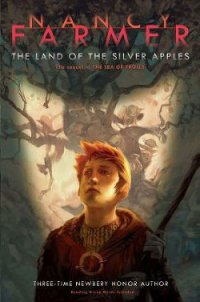Tehanu The Last Book of Earthsea - Le Guin Ursula Kroeber (читать бесплатно книги без сокращений TXT) 📗
Ged laid a knot on the fire to burn small and slow, and they both watched the leap and flutter of the flames.
“I’d like you to stay here, Ged,” she said. “If you like.” He did not answer at once. She said, “Maybe you’re going on to Havnor-”
“No, no. I have nowhere to go. I was looking for work.”
“Well, there’s plenty to be done here. Clearbrook won’t admit it, but his arthritis has about finished him for anything but gardening. I’ve been wanting help ever since I came back. I could have told the old blockhead what I thought of him for sending you off up the mountain that way, but it’s no use. He wouldn’t listen.”
“It was a good thing for me,” Ged said. “It was the time I needed.”
“You were herding sheep?”
“Goats. Right up at the top of the grazings. A boy they had took sick, and Serry took me on, sent me up there the first day. They keep ‘em up there high and late, so the underwool grows thick. This last month I had the mountain pretty much to myself. Serry sent me up that coat and some supplies, and said to keep the herd up as high as I could as long as I could. So I did. It was fine, up there.”
“Lonely,” she said.
He nodded, half smiling.
“You always have been alone.”
“Yes, I have.”
She said nothing. He looked at her.
“I’d like to work here,” he said.
“That’s settled, then," ‘ she said. After a while she added, “For the winter, anyway."
The frost was harder tonight. Their world was perfectly silent except for the whisper of the fire. The silence was like a presence between them. She lifted her head and looked at him.
“Well,” she said, “which bed shall I sleep in, Ged? The child’s, or yours?”
He drew breath. He spoke low. “Mine, if you will.”
“I will.”
The silence held him. She could see the effort he made to break from it. “If you’ll be patient with me,” he said.
“I have been patient with you for twenty-five years,” she said. She looked at him and began to laugh. “Come-come on, my dear-Better late than never! I’m only an old woman. . . . Nothing is wasted, nothing is ever wasted. You taught me that.” She stood up, and he stood; she put out her hands, and he took them. They embraced, and their embrace became close. They held each other so fiercely, so dearly, that they stopped knowing anything but each other. It did not matter which bed they meant to sleep in. They lay that night on the hearthstones, and there she taught Ged the mystery that the wisest man could not teach him.
He built up the fire once, and fetched the good weaving off the bench. Tenar made no objection this time. Her cloak and his sheepskin coat were their blankets.
They woke again at dawn. A faint silvery light lay on the dark, half-leafless branches of the oaks outside the window. Tenar stretched out full length to feel his warmth against her. After a while she murmured, “He was lying here. Hake. Right under us." . . .
Ged made a small noise of protest.
“Now you’re a man indeed,” she said. “Stuck another man full of holes, first, and lain with a woman, second. That’s the proper order, I suppose.
“Hush,” he murmured, turning to her, laying his head on her shoulder. “Don’t.”
“I will, Ged. Poor man! There’s no mercy in me, only justice. I wasn’t trained to mercy. Love is the only grace I have. Oh, Ged, don’t fear me! You were a man when I first saw you! It’s not a weapon or a woman can make a man, or magery either, or any power, anything but himself.”
They lay in warmth and sweet silence.
“Tell me something.”
He murmured assent sleepily.
“How did you happen to hear what they were saying? Hake and Handy and the other one. How did you happen to be just there, just then?”
He raised himself up on one elbow so he could look at her face. His own face was so open and vulnerable in its ease and fulfillment and tenderness that she had to reach up and touch his mouth, there where she had kissed it first, months ago, which led to his taking her into his arms again, and the conversation was not continued in words.
There were formalities to be got through. The chief of them was to tell Clearbrook and the other tenants of Oak Farm that she had replaced “the old master” with a hired hand. She did so promptly and bluntly. They could not do anything about it, nor did it entail any threat to them. A widow’s tenure of her husband’s property was contingent on there being no male heir or claimant. Flint’s son the seaman was the heir, and Flint’s widow was merely holding the farm for him. If she died, it would go to Clearbrook to hold for the heir; if Spark never claimed it, it would go to a distant cousin of Flint’s in Kahedanan. The two couples who did not own the land but held a life interest in the work and profit of the farming, as was common on Gont, could not be dislodged by any man the widow took up with, even if she married him; but she feared they might resent her lack of fidelity to Flint, whom they had after all known longer than she had. To her relief they made no objections at all. “Hawk” had won their approval with one jab of a pitchfork. Besides, it was only good sense in a woman to want a man in the house to protect her. If she took him into her bed, well, the appetites of widows were proverbial. And, after all, she was a foreigner.
The attitude of the villagers was much the same. A bit of whispering and sniggering, but little more. It seemed that being respectable was easier than Moss thought; or perhaps it was that used goods had little value.
She felt as soiled and diminished by their acceptance as she would have by their disapproval. Only Lark freed her from shame, by making no judgments at all, and using no words-man, woman, widow, foreigner-in place of what she saw, but simply looking, watching her and Hawk with interest, curiosity, envy, and generosity.
Because Lark did not see Hawk through the words herdsman, hired hand, widow’s man, but looked at him himself, she saw a good deal that puzzled her. His dignity and simplicity were not greater than that of other men she had known, but were a little different in quality; there was a size to him, she thought, not height or girth, certainly, but soul and mind. She said to Ivy, “That man hasn’t lived among goats all his life. He knows more about the world than he does about a farm.”
“I’d say he’s a sorcerer who’s been accursed or lost his power some way,” the witch said. “It happens.”
“Ah,” said Lark.
But the word “archmage” was too great and grand a word to bring from far-off pomps and palaces and fit to the dark-eyed, grey-haired man at Oak Farm, and she never did that. If she had, she could not have been as comfortable with him as she was. Even the idea of his having been a sorcerer made her a bit uneasy, the word getting in the way of the man, until she actually saw him again. He was up in one of the old apple trees in the orchard pruning out deadwood, and he called out a greeting to her as she came to the farm. His name fit him well, she thought, perched up there, and she waved at him, and smiled as she went on.
Tenar had not forgotten the question she had asked him on the hearthstones under the sheepskin coat. She asked it again, a few days or months later-time went along very sweet and easy for them in the stone house, on the winterbound farm. “You never told me," ‘ she said, “how you came to hear them talking on the road.”
“I told you, I think. I’d gone aside, hidden, when I heard
“Why?”
“I was alone, and knew there were some gangs around.”
“Yes, of course- But then just as they passed, Hake was talking about Therru?”
“He said ‘Oak Farm,’ I think.”
“It’s all perfectly possible. It just seems so convenient.” Knowing she did not disbelieve him, he lay back and waited .
“It’s the kind of thing that happens to a wizard,” she said.
“And others.”




